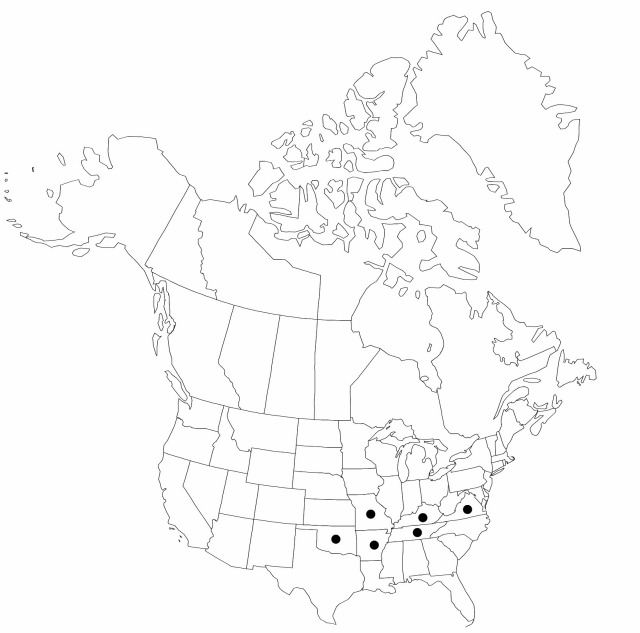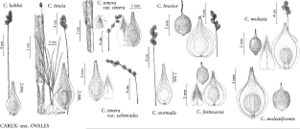Carex molestiformis
Contr. Univ. Michigan Herb. 21: 300, figs. 1, 2.3. 1997.
Plants cespitose; rhizomes appearing elongate only in old clumps. Culms 25–120 cm; vegetative culms few, inconspicuous, usually fewer than 15 leaves, not strikingly 3-ranked. Leaves: sheaths adaxially white-hyaline, summits U-shaped or truncate and reaching to 1.5 mm beyond collar, smooth; distal ligules 1.5–2.8 mm; blades 3–5 per fertile culm, 9–35 cm × 1.7–3.8 mm. Inflorescences congested or somewhat open, green to brown, 1.4–2.7(–3.4) cm × 7–16 mm; proximal internode 3–9 mm; 2d internode 3–8 mm; proximal bracts scalelike, bristle tips shorter than inflorescences. Spikes 2–5, distant, distinct, globose to ovoid, 10–35-flowered, 7–12 × 5–10 mm, base rounded or tapered, apex rounded; terminal spike usually lacking conspicuous staminate base. Pistillate scales yellowish brown, lance-ovate, 2.9–4 mm, 0.7–1.7 mm shorter than perigynium or reaching base or sometimes middle of perignyium beak, margins pale, apex acute or obtuse. Perigynia (10–)15–40(–45) per spike, ascending, light greenish brown to brown with pale margin, conspicuously 6-veined or more abaxially, 4–6-veined adaxially, broadly ovate to orbiculate, plano-convex, 4–5.4 × 2.4–3.4 mm, 0.5–0.6 mm thick, margin flat, including wing 0.3–0.8 mm wide, smooth; beak pale green or brown at tip, flat, 0.7–1.6(–1.8) mm, ciliate-serrulate, abaxial suture with white or hyaline golden brown margin, distance from beak tip to achene 1.7–2.6(–2.9) mm. Achenes broadly ovate to orbiculate, 1.6–2 × 1.4–1.8 mm, 0.5–0.6 mm thick. 2n = 74.
Phenology: Fruiting early summer.
Habitat: Stream flood plains, bottomlands, stream banks, roadsides
Elevation: 100–400 m
Distribution

Ark., Ky., Mo., Okla., Tenn., Va.
Discussion
Selected References
None.
